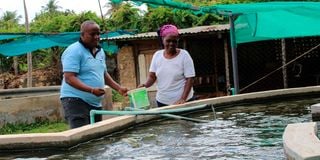Premium
How Paul Murage found sweet spot of fish business

Paul Murage with his mother Hilda feed fingerlings on their farm in Kilifi County.
On his parent's land in Mtwapa, Kilifi County, Paul Murage runs a fish farm.
The farm named Pwani Fish and Hatchery breeds tilapia, goldfish and catfish fingerlings.
The sight of fish darting in water with their mouths wide open to feed on pellets offers a great spectacle. "This fish offers some form of therapy for me besides being an excellent agribusiness," says Murage.
The farmer attributes the starting of the farm in 2013 to a road accident along Kilifi-Malindi Road in which he was involved.
“I had the passion of keeping fish but didn't have capital. However, the accident in 2012 was one of the things that pushed me into the business," says the 42-year-old, noting he used his insurance compensation to start the business.
Murage, a 2005 Bachelor of International Business graduate of United States International University Africa, said he visited Kenya Marine Fisheries and Research Institute and various fish farmers in Mtwapa for lessons.
“Having acquired the knowledge, I bought 500 tilapia and goldfish fingerlings and put them in a small concrete pond I had built."
Large ponds
Years down the line, Murage owns eight large ponds (of 6m diameter) and 22 small ones (3m diameter).
"I keep 5,000 fingerlings in the smaller ponds. The big ponds host the parent stock of about 800 fish."
Every day at 6 am, he checks the water levels in the ponds and temperature and takes remedial measures if need be.
“In case of inadequate oxygen in the ponds, we pump in more."
At 8 am, the workers feed the fingerlings and clean the ponds. If there are orders from customers, they harvest the fingerlings and grade them. Murage says feeding the fingerlings is crucial to produce quality products.
“For proper growth, we provide them with starter flour, grower feed and finisher feed pellets,” he says.
In a month, the farm buys at least 12 bags of feed pellets at Sh3,000 each.
"To cut the high cost of feeds, we started black soldier fly farming last year. We bought a colony from Nairobi at Sh10,000. We mainly feed them with fruit waste and wheat bran."
Murage sells the fingerlings at various prices about a month after hatching. An inch of goldfish goes for Sh100 while tilapia and catfish go for Sh10 and Sh15 respectively.
He plans to modernise the hatchery for easy testing of the salinity of the water and detection of changes in fish behaviour.
“Fish thrives in a cleaner environment thus water must not be contaminated from the source. It is important to produce products as recommended by the fisheries, department."
According to him, tilapia is affordable fish, thus, the more it is farmed, the more families will be able to buy it.
Grow amaranth
"Fish farming is an affordable business, especially for the youth. With some Sh20,000, you can construct a 10m2 tank and grow 50 tilapia fingerlings that can attain half a kilo in six to seven months."
He uses the waste discharged from the fish tanks to grow amaranth, bananas and arrowroots on half-acre.
His challenges include lengthy dry spells, which lead to high mortality of fingerlings because the water becomes hotter.
To avoid the heat, one must shade the ponds and tanks. There are also predators such as birds that target the fish.
Murage plans to grow fish for filleting as value addition will give him more income. He also seeks to boost agro-tourism activities.
His farm is visited by students from Pwani University and schools in Kilifi County.
Dr Karim Omido, a senior lecturer in business management at Taita Taveta University, says as demand for white meat grows, fish farming is an innovative way of generating income, and creating jobs and food.
“Demand for white meat is growing because of health issues, which makes fish farming a business that has a ready market."





